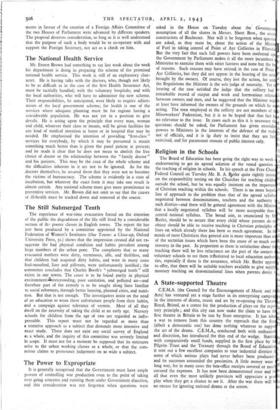The National Health Service
Mr. Ernest Brown had something to say last week about the work his department is doing in preparing the scheme of the promised national health service. This work is still of an exploratory char- acter. He is having talks with the doctors, who, though not likely to be as difficult as in the case of the first Health Insurance Act, must be tactfully handled; with the voluntary hospitals; and with the local authorities, who will have to administer the new scheme. Their responsibilities, he anticipated, were likely to require adjust- ments of the local government scheme; for health is one of the services where adequate planning must be for regions having a considerable population. He was not yet in a position to give details. He is acting upon the principle that every man, woman and child, whatever their class or 'means, will be given facilities for any kind of medical attention at home or in hospital that may be needed. He emphasised the intention of providing "first-class " services for everybody, by which it may be presumed is meant something much better than is given the panel patient at present; and he made it clear that he does not mean to abolish the free choice of doctor or the relationship between the " family doctor " and his patients. This may be the crux of the whole scheme and the difficulties inherent in it are not to be ignored. As for the doctors themselves, he assured them that they were not to becotme the victims of bureaucracy. The scheme is evidently in a state of incubation, but whatever the exact form it may take one result is almost certain. Any national scheme must give more prominence to preventive services. Mr. Brown did not omit to say that the causes of ill-health must be tracked down and removed at the source.


























 Previous page
Previous page